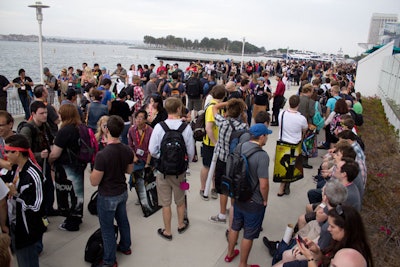People who are passionate about a brand can be the easiest to please at a brand event—or the hardest.
They’re already invested in the host, and they’re primed to participate in the experience, which makes them easier to please than, say, potential new customers who may or may not be interested, or seen-it-all journalists. And they’re likely to share the experience with their friends, in person and on social media. That’s why "super fan" has become a recent marketing buzzword, and fans have become a hot audience for event marketers.
But fans of a brand also require events that satisfy their desire for a deeper experience and that feel authentic to the brand they love. And they’ll complain loudly about an event that fails to meet their expectations.
So here are eight tips from marketers who produce events for super fans.
1. Respect their knowledge and passion
Especially for fans of things like a movie series, TV shows, and comic books, don’t underestimate the depth of their knowledge. “They know everything,” says Jeff Kaplan, vice president of global events and brand activation for Discovery Communications. “You're not going to fool them.”
2. Focus on content
While your primary goal at an event for fans might be to get them to buy more or to share their enthusiasm with other potential customers, the fans are there to get a deeper experience with the object of their obsession. "It has to be worthy of their time,” says Charlie Horsey, C.E.O. of New York-based marketing agency MKTG.
That means the event should focus on content more than marketing. David Glanzer, director of marketing and public relations for Comic-Con International in San Diego, advises sponsors to concentrate on adding value to the show, which draws more than 130,000 fans. “One of the things we really try to impart on our partners is, while we know a lot of companies see Comic-Con as a marketing opportunity, we don't see it that way. We as organizers try to put on the type of [event] we ourselves want to participate in,” he says. “If you go in with the idea that you're trying to sell something, you can easily turn somebody off."
3. Be authentic
Horsey says his firm treats super fans with kid gloves. “When we produce an event for them, it has to be extremely buttoned-up and in line with how they perceive the brand,” he says. “A lot of times I think brands fall short and dumb it down and it ends up backfiring on them."
When designing promotions for Mad Men, Linda Schupack, executive vice president of marketing for AMC, tries to channel the attention to detail of series creator Matt Weiner—and fans who are constantly on the lookout for inauthentic ’60s touches. “Our marketing has to be as attentive to the details as the show itself,” Schupack says. "If you are off the fans will be the first to tell you."
Likewise, as the Universal Studios theme parks in Hollywood and Orlando prepared experiences based on the AMC hit The Walking Dead, special effects makeup artist Greg Nicotero made sure they felt authentic to the series. (The show’s zombies are central to the parks’ “Halloween Horror Nights” events, which open September 20.) “For any event that we do we want to dimensionalize the experience that fans have with the show,” Schupack says.
4. Tailor your message
“We very consciously in our marketing materials are starting with the super fan," Schupack says. But the same messages don’t work for everyone.
When AMC introduced The Walking Dead at Comic-Con in 2010, the audience there was already familiar with the comic book series that inspired the show. So AMC’s booth and marketing materials focused on the zombies, with a look that was “more in-your-face, more genre” than materials developed for a broader consumer audience, Schupack says. “As we're going broader, it's less about the zombie aspect and more about the characters."
5. Ask them to create the event with you
"When you're creating an event, as a consumer marketer you're always deciding what you think will be the best experience for the consumer,” says Colleen Mohan, the senior vice president of brand marketing at USA Network. Often that means making something feel exclusive. But that might not be the way to go for super fans. “I think now the events are very inclusive,” Mohan says. “We now aren't the only ones calling the shots in deciding what an event looks like.”
For fan events around USA shows like Psych, Mohan looks for ways to get viewers involved as much as possible. “The events becomes more collaborative and ultimately more appealing to the fans," she says. For an on-air slumber party for Psych fans in February, viewers voted on which episodes would run in a six-hour marathon, and the network aired tweets and short fan videos during the broadcast. The network also shipped party boxes to some fans so they could incorporate props and logo items related to the show into their videos.
In monitoring the social media chatter about the promotion, Mohan noticed the anticipation of learning which episodes were chosen was a big part of the conversation. Looking back, she says, “We didn't hype that enough.”
6. Help them share your message
Once an event has excited the fans, it’s time to concentrate on the second goal: converting them to evangelists. “It's not what will they take away after the event, but what will they share after the event?” Mohan says. For USA’s fan-focused promotions, everything that fans do—like voting for an episode—can be posted to social media.
USA also creates tools that let fans create things to share, like meme generators that let Web site visitors put text on images from shows like Burn Notice and Suits and share the images on Facebook. "That's what they're going to want to share more," Mohan says.
7. Remember: sharing goes both ways
A big part of the reason super fans are such an attractive audience also makes them dangerous: They’re very interested in sharing their opinions with other fans. “Don't treat them like everybody else,” says Horsey. “The influence they have if you screw up is really bad."
"They will turn on you and let everybody know,” says Lance Fensterman, global vice president of ReedPOP, the division of Reed Exhibitions that produces eight fan-focused events, including New York Comic Con. “And it can be very damaging to you."
8. Be accountable (and have a thick skin)
Speaking of things going wrong: Passionate fans might endure a lot to have a great experience. But if they have a bad experience, the host needs to take responsibility. "They don't mind waiting in line,” Fensterman says. “They'll wait in line for hours, if it's well organized, and they know what they're waiting for." However, if they wait longer than they expected, or they don't get what they were promised, the host is going to have a problem. "You have to be able to answer. If someone wants to know who's to blame, you have to be able to be held accountable if something isn't right.”




















